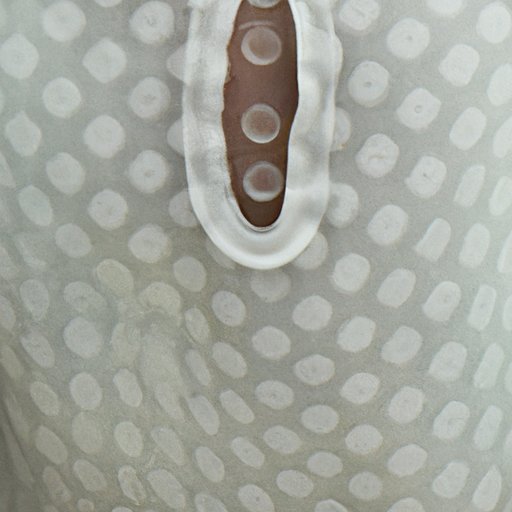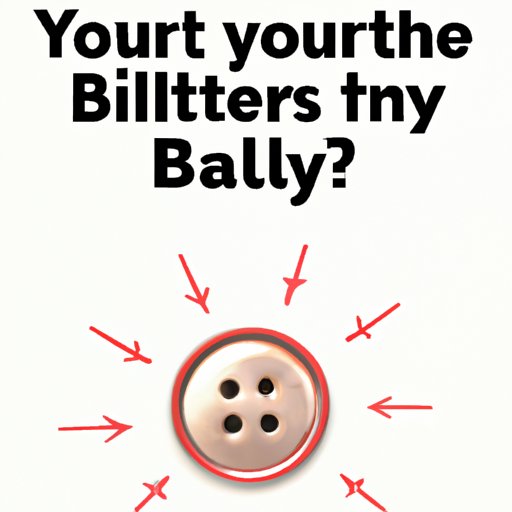

Introduction: The Importance of Paying Attention to Your Belly Button
Your belly button, also known as the navel, is a small area on your body that may not seem important. But did you know that your belly button can reveal important information about your health? Whether you have an innie or an outie, the way your belly button looks and feels can offer clues about your overall health. In this article, we’ll explore the relationship between your belly button and your health, and the different ways it can reveal your health secrets.
Exploring the Relationship Between Your Belly Button and Your Health
The basic anatomy of the belly button
The belly button is a scar that’s left behind after an umbilical cord is cut at birth, leaving the belly button as a small indentation or protrusion on your belly. The belly button is made up of several layers of tissue, including skin, fat, connective tissue, and muscle. Blood vessels and nerves also run through the belly button, making it an important part of the body’s network of blood vessels and nerves.
The role of the belly button in fetal development
The belly button plays a crucial role in fetal development. During pregnancy, the umbilical cord attaches the fetus to the placenta, which provides essential nutrients and oxygen to the developing baby. After birth, the umbilical cord is cut and the remaining tissue forms the belly button. This connection to the umbilical cord gives the belly button a deep connection to the body’s vital functions.
How the belly button can reveal health information about the body
The belly button can provide important clues about your overall health. Certain symptoms, such as pain, redness, discharge, or swelling in the belly button, can be signs of various health conditions. Checking your belly button regularly for changes can help you detect any potential health issues early and seek treatment as needed.
The Surprising Ways Your Belly Button Can Reveal Your Health Secrets
How the appearance of the belly button can indicate health issues
The appearance of the belly button can indicate various health issues. For instance, if you notice any redness, swelling, or discharge around the belly button, it could be a sign of a fungal or bacterial infection. If your belly button feels tender or painful, it could signal an underlying condition, such as an umbilical hernia or abscess.
The types of belly buttons and what they say about your health
There are several different types of belly buttons, including innies, outies, and umbilical hernias. An innie belly button is the most common type, and it’s usually a sign of good health. However, an outie belly button is less common and can indicate various conditions, such as a hernia or a weak abdominal wall. If you notice that your belly button has turned into an outie, it’s important to see your doctor to rule out any underlying medical issues.
What Your Belly Button is Trying to Tell You About Your Health
The common health conditions that can be detected through the belly button
The belly button can provide clues about various health conditions, such as:
– Urinary tract infections
– Fungal or bacterial infections
– Appendicitis
– Umbilical hernias
– Diverticulitis
– Inflammatory bowel disease
– Endometriosis
– Crohn’s disease
The symptoms to look out for
If you notice any of the following symptoms in your belly button, it’s important to consult your doctor:
– Pain or tenderness
– Redness or swelling
– Discharge or foul odor
– Bleeding
– Changes in appearance, such as an outie belly button or a persistent lump
The Science behind Your Belly Button and Your Health
The research and studies that have been conducted to link belly button to health
While the link between the belly button and health is not yet fully understood, there have been some studies that suggest a connection. For instance, a study published in the Journal of Investigative Dermatology found that the belly button can harbor a variety of bacteria, including Staphylococcus aureus, which can cause infections.
The possible explanations for why the belly button can reveal health information
There are several theories as to why the belly button can provide clues about your health. One possibility is that the belly button is a breeding ground for bacteria and other microorganisms, which can lead to infections or other health issues. Another possibility is that the belly button is a reflection of the body’s overall health and can signal imbalances or underlying medical conditions.
From Infection to Digestive Issues: What Your Belly Button Can Reveal About Your Health
How belly button infections occur and how to treat them
Belly button infections can occur when bacteria or fungi enter the navel and begin to multiply. This can lead to redness, swelling, and discharge from the belly button. If you suspect you have a belly button infection, it’s important to see your doctor for treatment, which may include antibiotics or antifungal medications.
How the belly button can indicate digestive issues and other health conditions
In addition to infections, the belly button can provide clues about various health conditions, such as digestive issues. For instance, if you notice bloating, constipation, or other digestive symptoms, it may indicate an underlying condition, such as inflammatory bowel disease or diverticulitis. Other conditions that can be detected through the belly button include endometriosis, ovarian cysts, and even cancer.
Conclusion: Why You Should Pay Attention to Your Belly Button and Listen to What it Says About Your Health
Your belly button may seem small and insignificant, but it can provide important clues about your overall health. From identifying infections to detecting underlying medical conditions, paying attention to the appearance and symptoms of your belly button can help you take charge of your health and seek treatment as needed. As always, it’s important to consult your doctor if you have any concerns about your health or if you notice any changes in your belly button.




